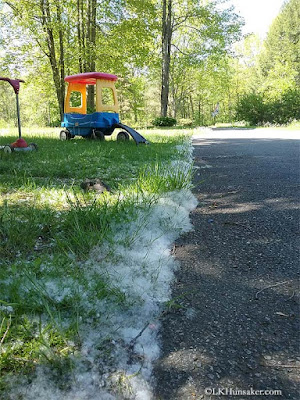Sadly, the answer to that is a resounding, "Yes!" At least according to the national board of whoever determines ridiculous school policies, they can. How do I know? My very smart barely 5-year-old granddaughter failed her screening two months ago. They are quite concerned about her lack of progress and want her to go to summer school.
Already.
She hasn't STARTED school yet, and already she needs summer school.
Does she really?
First of all, they're comparing her progress to that of a lot of kids who are nearly six and will be six within a month or so of starting school. She had been 5 for all of a few days when they tested her. That's a huge amount of difference at that age.
Second, the results are wrong. She can do more than she showed them. I know. I work with her, when she wants to. I don't push. I don't want learning to be a hated chore. I want it to be exciting so she WANTS to learn. I want her to realize how much she can do with what she learns. I've been reading to her since before she could sit up by herself. She loves books. She's starting to ask what things say. She's now starting to ask how to spell words. Of her own free will. Because she wants it.
That is something no tests measure. They don't check interest level. They don't take the whole child into consideration. It's only about statistics and the school's grade.
This is the actual form they gave us to show her progress, or lack of:

Now, honestly, should we be expecting this of little ones who haven't even started school? Some of it, maybe. Actually, I was surprised she did some of these as well as she did, since we haven't "worked" on it. She has been learning the value of learning since she was tiny, however. We keep electronics very limited, books in plentiful supply, and a plethora of toys on hand she uses very adeptly at very imaginative play (where is the check for that?). We also have been doing art together since she was two years old to fuel her creativity -- not only crafts, but actual art.
Where are the boxes for creativity?
Where did they mark the way she mixes colors to find out what they make, or that she asks what two colors make when mixed?
Where did they mark the fact she is already learning some piano and guitar? (Learning music is a huge step toward good literacy and overall school success.)
Where did they mark the way she was looking out for the baby in the room, protecting her from bigger kids, such as herself, to be sure she didn't pick up what might hurt her or get knocked into and hurt? It wasn't even a baby she knew, only a sibling of another child getting screened.
Where did they mark how polite and friendly she was the whole time, including how excited she was to meet a teacher?
Where is the 'grade' for doing the tasks she was asked to do rather than refusing?
What about the way every other child there was treated as a friend?
How about the way she makes up stories on her own and colors pictures to go with them?
And then there's the way she stepped up to comfort/help another child who was feeling rather shy about the whole thing. Where is her credit for that?
How about her memory? She has a ridiculously good memory. They don't know that, either. She picks stuff up just by seeing and hearing it and we're constantly surprised by what she knows.
Yes, I realize this was a cursory screening, but since they're using it to predict overall school success, it's severely lacking, and therefore, it honestly means nothing at all.
No, this little girl doesn't need summer school. No, she is not behind. No, she won't need "massive intervention" based on getting 22/100 on what they tested. Her "skill to print" her letters will be absolutely fine, since she's an artist and spends plenty of time drawing things much more complicated than letters. She will be the one at the forefront helping any other child she sees needing help, mainly with social issues. She's the one I could have used when I was young, that one who will take them by the hand and say "it's okay" when school is hard, no matter how much they know already or how smart they are because it's a big social scene.
It's how well a child deals with social/interpersonal issues that is the real factor in how well they succeed in school. Why is there no screening for that?
Granted, I do have concerns with her going to school. She is an extremely high energy child who MUST move around a lot, and her lack of focus on anything she doesn't want to do will be an issue. I'm quite sure the "see a doctor" conversation [suggesting meds to make it easier on the teachers] will come up (and get promptly dismissed). I know there will be issues. I'm ready for it. However, all the summer schools in the world will not take that out of her. She is who she is, and she's an incredible, sweet, loving child with a wonderful heart and tons of potential and I'm prepared to fight anything that threatens to take that away.
A caveat: I do not, in any way, blame any teacher for what they are required to do for the curriculum in order to try to stay "on standards." I understand they are governed by the school board and the board is governed by state and state somewhat by feds. This is not anti-school or anti-teacher. This is simply saying that we maybe need to evaluate the evaluations and protest what is expected of our children by those making the laws. We don't have to just give in. We have the power of voice and vote. Our children need education. Absolutely. But they also need to be children. They need to play. They need free time. They need understanding and flexibility.
And selfishly, I'm just not willing to give up half the summer and all of that precious time with my precious grandbabies sooner than absolutely necessary. That together time matters. We're doing the library preschool hour once a week, together. We're playing T-ball. We're running errands together. We're doing art together. And now and then, we work on letters and numbers together. And, the cousins are absolutely loving all of their together play time. It's precious time that will too soon be taken away by "the curriculum." Why start earlier than necessary? They'll learn well and willingly if they're taught to love to learn. They won't if they are only doing it on demand.
By all means, parents/grandparents should be encouraged to read to and with their children, to talk with and not at their children, to include them in daily events and talk about what's going on and what they're doing. Do activities together. Let them play and create and be sure they have writing tools available. Grab quick teaching moments whenever possible. Absolutely. Give them your time and attention. That's what will give them the best start without overwhelming them.
Yes, summer programs are wonderful for some children. But know your child and react to his/her best interest, not to those who do not know your child. 💓
Caveat #2: There are bigger successes than school curriculum success. I prefer to focus on the bigger picture and the whole child.












